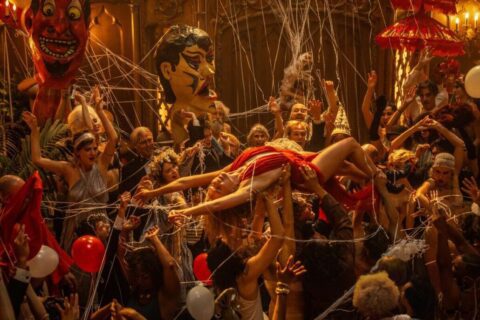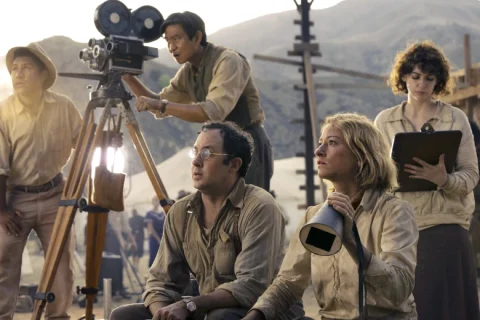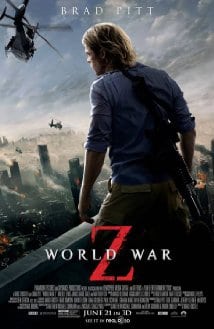Babylon (2022)
Directed by: Damien Chazelle
Written by: Damien Chazelle
Starring: Brad Pitt, Diego Calva, Jovan Adepo, Margot Robbie
USA
IN CINEMAS NOW
RUNNING TIME: 189 mins
REVIEWED BY: Dr Lenera

It’s the 1920’s, and the movies are all the rage, Hollywood bursting with activity. However, Hollywood is also a hotbed of decadence and debauchery. Manuel aka Manny Torres is a young Mexican who steps in at parties where excess has resulted in trouble, but who has industry ambitions. Jack Conrad is a screen icon burning his way through wives and girlfriends. Nellie LaRoy has just arrived from New Jersey and is determined to become a star no matter what it takes, despite also being a big party animal. And Sidney Palmer is an African-American jazz trumpeter who’s looking to shed his small-time stature of playing at parties, hoping to become highly prominent on the silver screen. However, none of them realise that talkies will soon be on the way….

Writer / director Damien Chazelle first had the idea to make this after he’d just completed his debut feature, the very low budget musical Guy And Madeline On A Park Bench. A producer told him it was far too ambitious a project but why didn’t he make another musical? However, Chazelle couldn’t even get La-La Land off the ground for ages and was only able to get it financed when Whiplash became a success, and only now do we finally have Babylon. It’s certainly Chazelle’s biggest and most ambitious picture, but is it a success artistically or is its flop status in the US deserved? Inspired most by Singin’ In The Rain [not only is it explicitly referenced twice but portions of the plot and even certain scenes play as variations or inversions of material from the 1952 classic] and the book Hollywood Babylon [by underground filmmaker Kenneth Auger] which was full of tales [a few questionable and one an outright lie] about the excesses of very old Hollywood which gives Chazelle a chance to explore his inner Ken Russell or Federico Fellini, It’s over three hours long. Hell, the title doesn’t appear on screen for around twenty minutes. However, it certainly doesn’t outstay its welcome even when Chazelle doesn’t seem to have properly sorted out his final act, while its recreation of early Hollywood is fascinating, including its weird melding of totally invented people, people clearly inspired by real ones, and characters who were real. Those interested in the very old days of Hollywood will be glued to the screen at times; being the sort of person who’d just as happily watch a film from 1923 as much as one from 2023, I genuinely loved many moments. However, all the main characters are very thin, meaning that we don’t understand them much more by the end than we did at the beginning, despite the best efforts of the stars including an incredible Margot Robbie who exudes so much energy that you can almost feel it. And, while Caezelle’s themes are easy to work out, it’s harder to discern what his actual stance on some of them is.
So there’s a big party in a mansion, held by the bosses of Kinoscope Studios, and en route to it is an elephant. The guy asked to transport it in his truck from where it’s been dropped to the party is unsure about doing so until Manny turns up and says he’ll help him. He also tells him that he can bring some family and friends with him, and rewards him with a woman who lets her piss on him. Manny then sees Nellie arrive in a car, already having consumed a lot and partly wrecking the car. Despite claiming that she’s already a star, she’s brand new in town and doesn’t have an invite. The instantly smitten Nellie gets her in and the two promptly locate a dinner tray packed with peaks of cocaine in a room before they join the others in the main area where the attendees are going wild with jazz and each other, with sights such as a midget riding a giant penis pogo stick that ejaculates. Chezelle goes straight on in there and uses the setting to also introduce most of the other main characters in a strong way. Nellie seems more interested in other random men than Manny, but then another problem suddenly makes itself known. Actresses Jane Thornton was having sex with actor Orville Pickwick and peeing on him ,but has been found dead from a drug overdose, and Manny is tasked with getting the body out without attracting attention, something which he soon comes up with a novel solution for. The incident seems to be a reference to when Roscoe “Fatty” Arbuckle, a popular comedian, was so obese that the force of his body weight ruptured starlet Virginia Rappe’s bladder during sex, resulting in a fatal infection. In the lead-up to her death, Rappe and friend Bambina Maude Delmont attempted to extort Arbuckle by accusing him of rape, while newspaper mandate William Randolph Hearst created a moral panic around Arbuckle by running a series of fictionalised stories, accusing Arbuckle of a variety of crimes, in addition to claiming that he killed Rappe by raping her with a champagne bottle. Arbuckle was acquitted after three trials but his career was ruined.
Manny befriends Jack who invites him to help out where his film is being shot, while Nellie’s flamboyant dancing attracts the right attention and she’s swiftly recruited to replace Jane in a Kinoscope film; during filming, she crudely upstages the star despite her role being a very minor one. The introduction to this scene is a truly wonderful piece of film-making, as the camera, in one unbroken take, takes its time to show us all the sights of a typical film set from the 1920’s. There are several very different films being shot here, but the biggest one is a costume picture featuring a large battle sequence where some of the extras go a bit mad and draw real blood. Jack is the star, and despite already nursing a hangover gets so boozed up again that he barely makes it up the hill in order to shoot a romantic moment with his co-star before the sun sets. The director doesn’t have the right camera, but Jack is really in charge, and he sends Manny goes and finds him one, whereupon Jack then performs the scene perfectly. There are loads of stories about wrecked stars still able to do the business on camera. Manny begins to climb the studio system’s ranks in an environment which wasn’t always that friendly to Mexicans, while Nellie quickly becomes an “it girl” covered by gossip columnist Elinor St. John, who doesn’t dwell on her hedonistic life style even when she does things like egg on her incompetent manager of a father to fight a snake and gets bitten herself. Jack goes from wife to wife with barely a day’s break, though he doesn’t make a play for Nellie. But then Nellie’s sexuality is only alluded to which is curious. She mentions things such as the size of Gary Cooper’s schlong [seemingly a fact, might I add], from which we assume that she sleeps around, and dances and kisses a lesbian, but most important is her keeping poor Manny around though she clearly doesn’t love him [do they even have a relationship?]. In any case, sound eventually becomes a thing. Will Jack and Nellie, unlike a great many silent stars, be able to make the transition to a talking and also “cleaner” Hollywood successfully?

We only care a little about the plight of Jack, who really wants to do material of worth before the idea of him being possibly past it, and indeed his own mortality, creeps up on him. Brad Pitt is fine, but just compare the writing of his character to his not dissimilar one in Once Upon A Time In Hollywood and unfavourable comparisons can be made, despite Chazelle clearly basing Jack on John Gilbert. As for Robbie, playing someone inspired by Clara Bow, she throws herself into her role and never comes up for breath, though we’re never sure if we’re supposed to like her or not. That in itself is not necessarily a problem, but we never get close to understanding her either. I’m not sure if Manny is intended to echo a real-life personage, but he comes across as being too perfect, though it’s understandable that Chazelle felt his film needed a human moral compass. Some are probably saying that Babylon is too long, but I’m not that it’s long enough, seeing as some major characters are given short shrift, most notably Sidney. Constantly told off by his band mates for his supposed rubbish saxophone playing, Sidney is picked to play in an orchestra that will often appear in cinema programmes. However, you just know what will raise its ugly head. Then there’s Chinese-American lesbian cabaret singer Lady Fay Zhu [Li Jun Li] who remains something of an enigma, though Jean Smart’s Luoella Parsons-inspired gossip columnist Elinor St. John makes a strong impression. It’s unlikely that both Jack and Nellie would have found themselves working with Hollywood’s only female director of the time; this smacks of the usual Hollywood messaging that we get these days. Saying that, there are examples of anachronisms throughout, though I’m sure Chazelle was aware of this, even if he focuses more on excess. Towards the end, he injects a gangster element which seems a bit out of place if not exactly unbelievable, but which ends up taking us on a near-dissent into hell, as the party faithful keeps going but wants ever greater sensations.
Sometimes he just wants to shock in a juvenile way. I forgot to mention that the elephant in the early scenes lets out a huge amount of poo, while one of Robbie’s best scenes performance-wise is when Nellie, at a more “respectable” party, finds the hypocrisy of the people she has to be nice to too much for her to bear, gets drunk, stuffs food and throws up. A lot. Yet there are also some very funny scenes, the best of them being when Nellie is performing in her first talkie which, due to the limitations of the sound recording equipment, requires her to walk over to specific areas of the set to say her lines. She stands in the wrong place, speaks too loudly which shatters a piece of equipment, somebody sniffs, somebody else knocks on the door of the set – everything transpires to make Nellie have to re-do her simple scene over and over again while the poor cinematographer roasts inside a huge box. What makes this so good is not just that it’s funny, but is exactly how early talkies were filmed. It’s no wonder that many silent performers didn’t fare well and even lost their careers. This is also why early talkies tend to be very static. I guess that Chazelle is lamenting what happened, and also how Hollywood could chew up and spit out people no matter how popular they might be for a while. Babylon was of course the name of the city where people erected a tower to reach God which caused God to create the world’s languages. It was also destroyed by God because of its debauchery. So maybe there’s your metaphor there! Yet Chazelle clearly loves filming the party scenes, the camera of cinematographer Linus Sandgren enjoying exploring the settings and what’s going on in them. Meanwhile the music of Justin Hurwitz often mimics the popular styles of the time and sometimes enhances elements to give an idea to the modern viewer how people would have felt about the music at the time. His two main themes sound right out of La-La Land and I kept expecting words to be put to them.
Babylon concludes with a somewhat pointless epilogue set many years later, then a final scene which is very similar to that wonderful ending of Cinema Paradiso, and which is obviously designed to have a similar effect. However, it fails to have the emotional impact of the finale of Giuseppe Tornatore’s film, because we haven’t been that invested in what’s gone on before. We certainly haven’t been bored, we’ve definitely been entertained, but something’s been missing – and it’s not as if Chazelle is unable to make us truly care, nor not give us affecting finales. Whiplash and La-La Land proved both of those things in spades. Instead, Babylon leaves an almost impressionistic impression, which I guess might be appropriate really.







3rdact draggedbut overall I loved it. Maggots hairdo was wrong. Probably should have been a tv series not a movie
Yes I can imagine how a TV series would have done certain aspects more justice, created a more balanced narrative. Seeing as this has [predictably in my view] flopped big time, maybe that’s what they should have done in the first place?
What was overall input of bianca beckles rose ? I wish to sponsor her career if I may as we are good friends anyway and so we , bianca and I, are close buddies. She will recall well myself as Mark a family friend of her past. Once contact re-established it would help her enormously. Thanks.